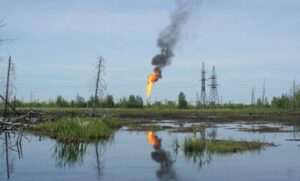By Adam Peltz and Elizabeth Lieberknecht
Recently, Louisiana, under the leadership of Gov. John Bel Edwards, became the latest state taking action to curb pollution and waste from oil and gas production. In a new proposal, the state says it will limit natural gas venting and flaring and attempt to reduce the risk of thousands of idle wells becoming orphaned. Both actions will help create jobs, protect taxpayers and safeguard the environment. Here’s how.
A future without excessive venting and flaring
Venting and flaring is a particularly wasteful practice in the oil and gas industry. Routine flaring occurs when operators burn off natural gas produced from oil wells instead of capturing it and selling it or putting it to productive use, while venting is the intentional release of natural gas directly into the atmosphere.
These practices not only create air and climate pollution, they also waste a valuable energy resource because methane essentially is natural gas. In 2019, Louisiana oil and gas producers wasted approximately 5.2 billion cubic feet of methane through venting and flaring alone — that’s $16 million of natural gas. That’s enough wasted gas to supply all the households in Baton Rouge for over a year and a half.
New rules could mean less waste, less pollution and more jobs for Louisiana Share on XReducing this waste is overwhelmingly cost-effective and can help create good-paying jobs in the fast-growing methane mitigation industry, which already boasts 32 facilities across the state.
Louisiana’s proposal would prohibit flaring at certain wells, require operators to develop a plan for how they will manage gas at any new wells, improve flare safety standards and require companies to report gas that is vented or flared. These updates will help modernize the state’s oil and gas regulations and reduce wasted gas. In the Gulf South’s first Climate Action Plan, Gov. Edwards’ administration identified that addressing methane waste from venting and flaring reduces harmful climate pollution and with this rulemaking, and now they are delivering.
Preventing catastrophic tide of orphaned wells
Another problem plaguing Louisiana is the issue of oil and gas wells that have been left by their owners to idle without producing for years or even decades to avoid the cost of proper closure. There are over 28,000 wells across the state that aren’t actively producing energy but also haven’t been permanently sealed. They represent a potential $2.5 billion taxpayer liability if not plugged by their owners — on top of the state’s current liability of $400 million from its existing documented orphan wells. And unplugged wells can cause a host of economic, environmental and even public health and safety problems by leaking methane and air toxics, contaminating groundwater and preventing economically beneficial alternative uses of the geology.
Companies can leave a well idle essentially indefinitely, and many choose to do so to avoid spending money to properly seal or plug it — with only minimal showing of potential future utility for oil and gas production. Over three-fourths of Louisiana’s idle wells are over 30 years old, and over one-third have not produced in ten years or more — with some out of production for more than five decades.  Most inactive wells do not produce after a few years of being idle — instead, their risk of becoming orphaned only increases over time. This effectively operates as loophole that threatens a flood of potential orphaned wells on the horizon, ready to slam already overburdened Louisiana taxpayers with the responsibility of addressing the problem that ought to have been addressed by the industry.
Most inactive wells do not produce after a few years of being idle — instead, their risk of becoming orphaned only increases over time. This effectively operates as loophole that threatens a flood of potential orphaned wells on the horizon, ready to slam already overburdened Louisiana taxpayers with the responsibility of addressing the problem that ought to have been addressed by the industry.
Louisiana is already creating jobs through its Orphan Well Program, but requiring the oil and gas industry to plug its inactive wells would create thousands more good-paying jobs across the state.
Proactively addressing this issue and preventing these wells from adding to the state’s sizable orphan well problem is an opportunity to create jobs while safeguarding the environment and public health from future damage — and, as with venting and flaring, curbing orphan wells is a key plant of Louisiana’s Climate Action Plan.
These rules are an opportunity for Louisiana to rein in wasteful venting and flaring as well as require oil and gas companies to pay for plugging their oil and gas wells when they reach the end of their useful life. The proposals from the Edwards administration are an important step in the right direction.











